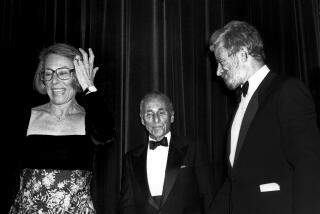If Not Now, When? by Primo Levi, translated by William Weaver; introduction by Irving Howe (Summit: $15.95; 349 pp.)
War writers used to favor the verb “to hurl.” It was popular in World War II, even on the Eastern Front. Hitler would “hurl” 10 divisions against the Russian lines. Later, the Red Army would “hurl” its forces against the retreating Hitlerites.
It was like hurling tureens of porridge. The blows landed but a lot got spilled on the way. Behind the front, whichever direction it was moving, was the lunar desolation of the Ukraine, Byelorussia, Poland. Across it, like feral survivors on a burned-out planet, moved clumps and clots of stragglers, deserters, escaped prisoners, partisans and refugees.
It is on this dark landscape that Primo Levi has set his fictional chronicle “If Not Now, When?” The title is from a saying of Rabbi Hillel in the Talmud that begins, “If I am not for myself, who will be for me?” It is the story of a ragtag, indomitable band of Jewish partisans who fight, hide and persevere on a trek through the war on the Eastern Front.
Levi is an Italian Jew who fought with the Partisans in Italy, was captured and eventually sent to Auschwitz. He wrote about his time there in “If This Is a Man” and about his postwar wanderings through Eastern Europe and his return to Italy in “The Truce.” Late last year, a book of autobiographical essays, “The Periodic Table,” was published here. It was brilliant, grave and oddly sunny; certainly a masterpiece, possibly his masterpiece.
Levi, like others who went through the horrors of the Holocaust, always confronts it, but in a special way. It was a towering volcanic eruption in his landscape; he writes about it directly but without self-immolation; he writes about it, as well, by writing about the landscape. In his introduction, Irving Howe uses a marvelous phrase to describe Levi’s pungent humanism. He speaks of his “moral poise.”
“If Not Now, When?” is remarkable in many ways, but the proportion of art to incident is less than in “The Periodic Table.” Levi’s strength is to speak in his own voice, transmuting his experience directly into something that transcends it. In this book, he draws partly on what he has seen and much more on what he has heard or read. This is not in itself a defect, and the material is extraordinary.
The problem is the fictional form he uses. He is not really a master of it. Some of the characters live in their own right. Others are composites, and still others seem to exist for the sake of what they have to say, like figures in a moral fable.
Still, what they have to say is more than worth hearing. And Levi’s voice, humane, precise and unexpected, comes through repeatedly, mostly in the character of Mendel.
Mendel is the unifying thread and consciousness of “If Not Now.” When the book begins, he is parked on the landscape, a Soviet gunner whose unit was overrun. He hides in the woods to avoid capture by the Germans, and forages meagerly, prepared to sit out the war.
An escaped prisoner, Leonid, comes along, and Mendel is set in motion. He leads the reluctant Leonid--whose balkiness is “like dust in a watch”--to find a partisan band to join. The first one rejects them because they are Jews. They wander farther, seeking and eventually finding a Jewish group that has taken over an abandoned monastery. Led by Dov, a fervent Soviet patriot, it acts as a kind of crude supplier to other partisan groups, and conducts occasional sorties of its own.
The physical hardship, the hunger, the desperate shortage of supplies, the danger and the grimness of winter are vividly described. The Germans attack and kill most of them, and Mendel, Dov and a few others join a large, well-organized “official” partisan group regularly supplied by the Soviet air force and under firm Soviet control.
Before long, Mendel and most of his companions have left to join up with Gedaleh, leader of a wandering and fighting band of Jewish partisans of assorted nationalities. Gedaleh is flamboyant, funny, a brilliant soldier, a mystic and a violin player. He and his people represent a spirit that Levi is trying to evoke: the ghetto wit and wisdom that hardened itself to fight the Germans and make its way to settle and fight in Israel.
Gedaleh is too much of an extraordinary compendium to seem quite real. Some of the smaller characters come to life better; notably Pyotr, a splendidly contradictory Russian who is both a Stalinist and a Christian. He criticizes his Jewish companions for thinking too much--discussions as to whether worms are kosher, or would be if they had hoofs, infuriate him--and finally decides to accompany them to Israel.
The band makes its way gradually westward, hijacking trains, killing Germans and living off the land. If the characters sometimes seem arranged, the narrative and incident are unflagging. The war ends, and they evade the morass of displaced humanity, thanks to Gedaleh’s ability to cajole as well as he fights. He persuades a music-loving railroad worker to attach a coach to a Milan-bound train, and the group, which has walked through so much hardship, crosses into Italy in something approaching luxury.
They are welcomed by Chaim, a member of the British army’s Palestinian Brigade. He will pass them along to groups that smuggle settlers to Israel. But first he tells these puzzled Eastern European Jews about the oddities of Italy--”a country of good people who don’t much like war”--and of Italian Jews who speak no Yiddish and who consider their Jewishness as simply an Italian regional variation.
It is Levi speaking, of course, and Chaim is not so much a real person as a Houyhnhnm telling a party of Gullivers about his country. Levi’s own life has taken him through the ordeal of being both Houyhnhnm and Gulliver. Swift went mad. Levi, even in this uneven book, commands a rare and precious sanity.
More to Read
Sign up for our Book Club newsletter
Get the latest news, events and more from the Los Angeles Times Book Club, and help us get L.A. reading and talking.
You may occasionally receive promotional content from the Los Angeles Times.






